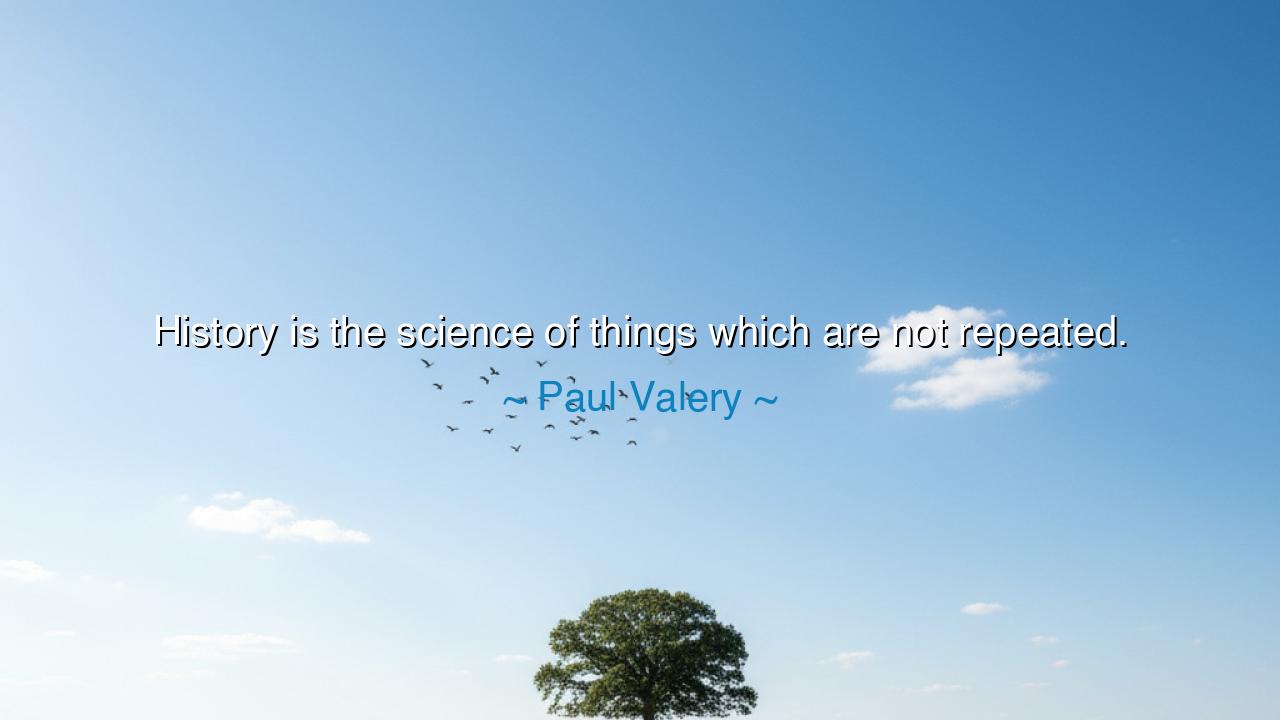
History is the science of things which are not repeated.






“History is the science of things which are not repeated.” — Paul Valéry
Thus spoke Paul Valéry, the French poet and philosopher whose mind was both a sculptor of beauty and a seeker of truth. His words ring like a bell in the great temple of time — “History is the science of things which are not repeated.” At first, they sound like a paradox, for history is filled with cycles, with wars, empires, and follies that seem to rise and fall again and again. Yet Valéry, in his quiet wisdom, reminds us that beneath the surface of resemblance, nothing in history ever truly repeats, for the world is never the same, and neither are we. Each age is a new constellation of forces, hearts, and choices — familiar, perhaps, but never identical.
To call history a science is to honor the discipline of the mind that seeks patterns, causes, and truths in the chaos of events. Yet Valéry’s genius lies in the second half of his saying — for while science usually studies what can be replicated, history studies what cannot. It is the record of unique moments, singular fates, and unrepeatable combinations of human will and circumstance. The birth of Rome, the fall of Constantinople, the storming of the Bastille — each stands alone, the child of a thousand conditions that will never gather again in the same way. Thus, history is not a laboratory of repetition but a mirror of uniqueness, showing us the fleeting yet eternal nature of human endeavor.
Consider, for example, the tragedy and triumph of World War II. Many have tried to compare it to wars before and after, yet it stands apart, unmatched in scale, in horror, in transformation. The rise of fascism, the terror of the Holocaust, the dawn of nuclear fire — these were not echoes but revelations, events that reshaped the soul of humanity forever. The same hatred that fuels war may be eternal, but the form it takes, the lessons it yields, the suffering it causes — these are bound to their time and cannot return unchanged. Thus, to study history is not to predict the future, but to understand the unrepeatable — to see how the river of human experience, though it flows in patterns, never passes the same stone twice.
In the days of the ancients, Heraclitus taught, “No man ever steps in the same river twice.” Valéry’s words are born of that same wisdom. The river of history may carry familiar tides — ambition, greed, courage, love — yet each current is new. The historian, then, is like the philosopher by the riverbank, watching the water pass, knowing that each moment is a sacred fragment of eternity, lost the instant it is born. This awareness gives history its power: not to promise repetition, but to awaken remembrance. For if the events of history cannot return, their meanings may still live within us, shaping our conscience and guiding our choices.
And yet, there is danger in misunderstanding history. Too many look upon the past and say, “It will happen again,” and so they prepare for battles that no longer exist. Others say, “It cannot happen here,” and thus they close their eyes to the signs that it may. Valéry warns us to walk the middle path — to see in history not prophecy, but insight. For though events are not repeated, the tendencies of the human heart endure. We cannot relive Rome’s fall, but we can recognize the arrogance that destroyed it. We cannot return to the Middle Ages, but we can still succumb to fear and ignorance. The wise study the unrepeatable not to foresee the future, but to strengthen their understanding of what it means to be human.
There is also hope in Valéry’s words. If history does not repeat, then humanity is not condemned to its past. The wars, injustices, and cruelties of yesterday are not prisons but warnings. We are free to choose differently, to act with greater wisdom, to create a future unlike any before. The science of things that are not repeated teaches us that change is always possible, that every generation stands at the threshold of the unknown. Each age is a new experiment in the vast laboratory of existence, where the materials are ancient, but the combinations are endlessly new.
So, O children of time, remember this: the past is a teacher, not a tyrant. Study it not to relive it, but to transcend it. When you look upon the chronicles of kings and revolutions, do not say, “This will happen again,” but ask, “What can I do so that it does not?” For history’s greatest gift is not repetition, but revelation. It shows us that every moment is singular, every life unrepeatable, every choice sacred. To walk wisely upon the earth, then, is to honor what has been, learn from it, and create anew. For as Paul Valéry reminds us, history is not the cycle of what returns — it is the memory of what never shall again be.






AAdministratorAdministrator
Welcome, honored guests. Please leave a comment, we will respond soon